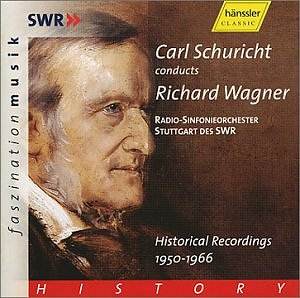Carl Schuricht (1880-1967) was born three years before
Wagner’s death, the son of an organ builder and an oratorio singer.
His composition teachers included Humperdinck and Reger but he soon
began on the bottom rung of the traditional operatic conducting career
with his appointment as coach, then conductor in various German opera
houses just like his contemporaries Klemperer, Furtwängler and
Walter, attaining his first post as GMD (General Music Director) at
Wiesbaden in 1922, an association which would last twenty years. An
early champion of Mahler (he gave performances of the second, third
and eighth symphonies as well as an early account of Das Lied von
der Erde) he began to tour extensively throughout Europe, in particular
in Holland, and to the USA between the wars. Though never persecuted
by the Nazis, he endured increasingly restricted activity until he managed
to move to Switzerland in 1944. For the rest of his life he refused
to be tied to a post and became a frequent guest with many orchestras,
in particular those run by German radio stations, with one of which
he appears in this compilation of Wagner orchestral excerpts.
Steeped in the heavyweight Romantic repertoire from
Beethoven to Bruckner, Mahler, Strauss, Reger, he was nevertheless versatile
enough to give a light touch to the music of Bizet, Johann Strauss and
Offenbach as well as a curious predilection for Gottfried Stölzel,
a contemporary of Bach. By the end his arthritic problems were limiting
his conducting technique and so his interpretations tended to be conveyed
to his players by charismatic magnetism (photos reveal an intense stare
from a skeletal head below which bobbed the inevitable spotted bow tie).
The SWR orchestra has preserved an archive of his work with them over
a period of sixteen years, and what with Celibidache’s time with the
same band (1971-1983) that orchestra can count themselves highly fortunate.
The earliest (the Prelude to the opera Tristan and Isolde) dates
from a live concert in 1950 from a bomb-damaged concert hall, more of
archival interest than anything else. The orchestral excerpts from Götterdämmerung
and Siegfried, and the Siegfried Idyll were astonishingly
all recorded on the same day (27 September 1955) and very fine they
are too. The sound quality is inevitably vastly superior in the first
and last tracks (excerpts from Parsifal), made a full
twelve to sixteen years after the other five (on 18 March 1966) when
Schuricht was terminally ill. Nevertheless the galvanised intensity
of the playing is electrifying throughout.
Christopher Fifield
See also review
by Adrian Smith


